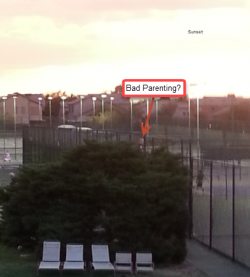
No one ever learned to walk by walking ~ Moshe Feldenkrais
Raising children these days, as I’m sure many of you would attest, is quite different than it was when we were growing up. Indeed, when I see kids being sent out to play draped in body armor and parents hovering over their every move, I cannot help but wonder: How the fuck did I ever survive childhood?
Whether it was due to circumstance, their own upbringing, or by design, my parents subscribed to a parenting philosophy that can best be described as “prepare your kid for the road, not the road for the kid.” Admittedly, on more than many an occasion I ended up choosing the wrong road but that kind of parenting strategy clearly has its benefits. Not only does it produce kids who are independent, adaptable, and able to take care of themselves at an early age, it also results in adults who are tolerant and accepting of other viewpoints.
Given my perceived benefits of this approach, we’ve attempted to raise our son in this same, less interventionist way with some modifications here and there to save him trips to the ER and military school. I say “attempted” because quite honestly it’s difficult not to be influenced by a society that seeks the convenience of paving a path that frees kids from making their own mistakes.
A quick example.
Many of you know I have been a part-time single parent since my son was a baby. Because my workday rarely ends when his school is out, like many single parents, I’ve had to devise strategies for getting work done after picking him up. Until the incident I’m about to describe occurred, my own strategy was to set up shop on the second-floor porch of a local fitness club and let my kid run around unsupervised.
One night while working on a proposal, having a sip of wine, and taking in another awesome Tucson sunset I couldn’t I help but notice folks pointing in the direction of the sunset. At just about the same time as I was wondering what was going on, I heard “it.” The scream. “Daaaaddddyyy!!!”
Between the scream and all the folks pointing, it didn’t take me long to locate my four-year-old son stuck at the very top of a tree. We don’t really have climbing trees in Arizona and it’s not exactly clear how he managed to get up there but, as the photo below shows, the tennis court fence does a really good job putting into perspective just how high he was.
Needless to say, I was able to get my son out of the tree and there are some really cool pictures like this one circulating. However, from the frowns and shaking heads, it was clear some people disapproved that I wasn’t watching over him more closely (much less taking a picture with a glass of wine in my hand). Shortly thereafter, more than likely as a result of the incident, a large warning sign was erected requiring kids under the age of 13 to be under the close care of a parent.
The incident only resulted in a minor inconvenience for me but in situations when parents count on family members to pull their own weight so they can put food on the table, frowning upon independent kids clearly has some serious downsides.
A good friend of mine who, at the time was a single mom living in New Jersey, had bought a house in a neighborhood that easily allowed her kids to walk to school. The trip between her house and school was not only perceived to be safe but, because much of the route circumvented traffic via a pedestrian path, took less than 10 minutes for her kids to get there. A few weeks after school had started she was told her kids needed to take the school bus. Although I’m not privy to the details of the school’s rationale, I have to assume that in an upper-middle-class neighborhood, that frowns and shaking heads are what forced the issue.
The result?
In the short run anyway, the kids were made to take the bus via a trip that took 30 minutes longer than walking.
In their excellent book, The Coddling of the American Mind, Greg Lukianoff and Jonathan Haidt document how overprotective “helicopter parenting” is creating kids who aren’t able to take care of themselves as adults and are intolerant to opposing viewpoints. Not only is this phenomenon transforming institutions such as universities into ideological echo chambers but it’s also creating an environment where outcome gaps are being used as evidence of systemic injustice rather than as a starting point for investigation.
So what’s the answer? With the blog already running too long, I’ll hold off on sharing some of their suggestions until next week. Until then, for those of you interested in the topic, a great place to start is the Atlantic Monthly piece that served as the inspiration for the cited book.
As to some music for our Manufacturing Peace of Mind™ Spotify playlist here is a great tune by Mt. Joy titled “Sheep”. Hope you like it as much as I do.
Cheers…xian
Video not displaying properly? Click here.









